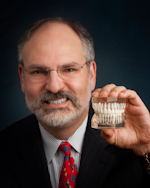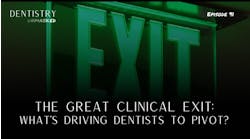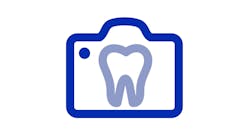Balancing: Art, Science, & Business of Dentistry
My dear dental friend, mentor, and teacher, Dr. Earl Slusky, had a profound saying: “You only need to have affability, availability, and ability,” to be successful. How hard can it be to do all of that? It is very hard, and then I am asking you to add two more A’s: affordability and accountability.
Affability: Affable people are pleasant and at ease in talking with others. They are likable and people enjoy being with them. Patients should like you and want to be with you.
Availability: You must be available for your patients, but as a very busy dentist it can be hard to do this on a daily basis. We have spoken about using technology to communicate, and everyone is using texting. I hope all of you have an answering service and respond to texts.
Ability is something we need to work on continually. I took a course with Dr. Paul Homoly about 40 years ago. He talked about the dentist who is a “natural”—“the person who can take a 330 bur and do perfect preps versus the person who uses every bur and nothing works.”
Are you willing to take the courses, do the work, and practice to gain the ability? According to Malcolm Gladwell, “It takes 10,000 hours of intensive practice to achieve mastery of complex skills and materials, like playing the violin or getting as good as Bill Gates at computer programming.”1
More from the author:
- Why it's not just patients who need to say "yes" to treatment
- Is there room for improvement? Here's how to get better
Affordability: Everyone should be striving for great esthetics, great function, great longevity, and a great experience. I believe affordability is based on transparency about fees and time that it takes to do great work.
I believe we must present a fair fee up front so the patient understands what they are committing to for their treatment. “Mrs. Smith, you need 30 crowns and they are each X and the total is Y. Is that something you are interested in doing?” Of course, this comes back to affability and having the patients like being with you.
The most important interaction you can have with the patient is at the very beginning: “Why have you come to our office and what can I do for you?” As Dr. Omer Reed said, “People don’t care how much you know until they know how much you care.” Do you really care about your patients, or do you only care about yourself and your needs? Are you putting your patients’ needs first or second?
Avoid high-pressure tactics; they will backfire and both you and the patient will be unhappy. The patient must understand the costs and the time commitment. Patients are used to paying things monthly and we allow them to do that. This is a very controversial subject and a future column will discuss this.
Accountability: We should be our own best critics. Think about doing one of the most difficult procedures in dentistry: a single front crown. You work hard. You try it in, and then the moment of truth arrives—the patient mirror test. “Oh, it looks nice,” and you breathe a sigh of relief because “the patient bought it.”
This is so wrong. You should be the one who decides if it looks great. Never show a patient anything until you are completely satisfied. Have very high standards. To do that, you need lab partners who are at the top of their game. You are accountable to yourself, and your staff will be proud of the level of care you provide.
All of the A’s are difficult to accomplish, but when you do, you will achieve balance. If I can do it, so can you.
Editor's note: This article appeared in the October 2022 print edition of Dental Economics magazine. Dentists in North America are eligible for a complimentary print subscription. Sign up here.
Reference
- Young JR. Researcher behind ‘10,000-hour rule’ says good teaching matters, not just practice. EdSurge. May 5, 2020. https://www.edsurge.com/news/2020-05-05-researcher-behind-10-000-hour-rule-says-good-teaching-matters-not-just-practice







